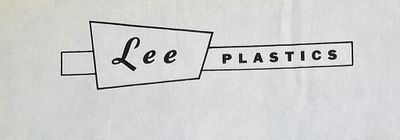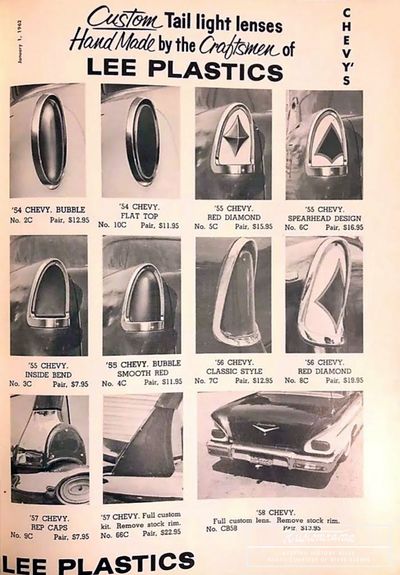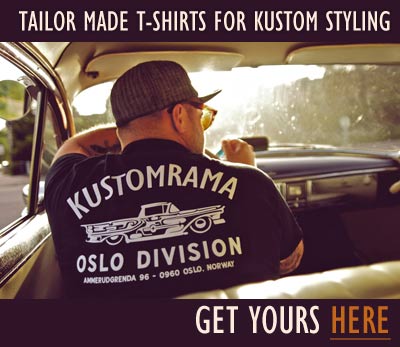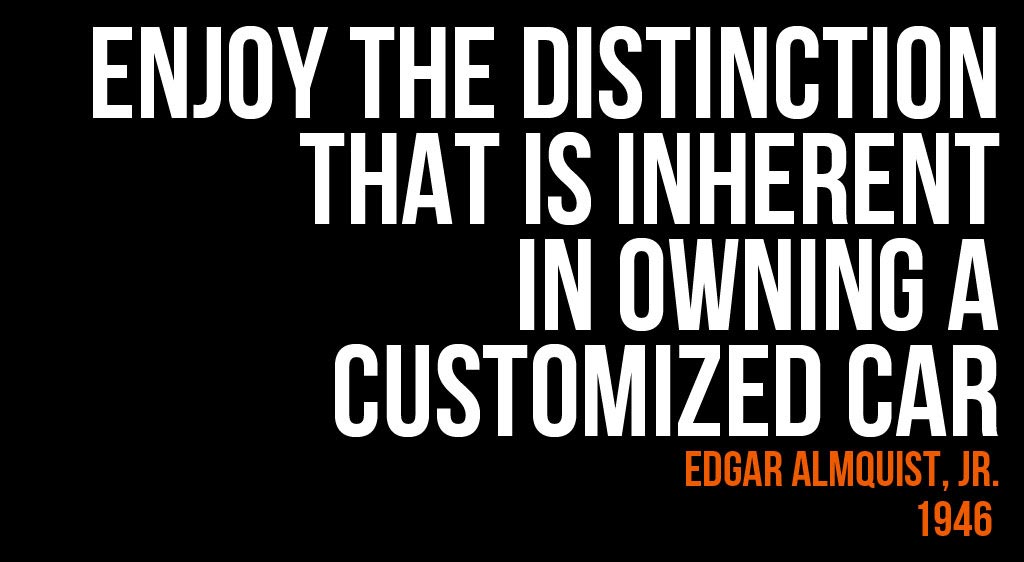Lee Plastic Company































Lee Plastic Company was a company in Detroit, Michigan that fabricated and sold custom taillight lenses. The company was founded and operated by Marvin D. Jarnagin of Detroit, Michigan.[1]
Contents
Marvin Jarnagin - Fake it Until You Make it!
Marvin was born in 1904 in Kentucky. He was a redhead, and his nickname was Red, even long after his hair turned gray. In August of 2022, his granddaughter, Beth Stewart, told Sondre Kvipt of Kustomrama that he was also a self-educated man as his formal schooling ended when he was probably between the age of 10 and 14. Marvin did all kinds of jobs, anything he could to survive, and he moved to Detroit to find employment during the Great Depression. "He talked his way into a job saying he had the required skills and then faked it until he knew it." Beth describes him as a life-long learner. "Loved nature and learned as much as he could. He'd learn it, then teach it to his grandkids."[1]
In the early 1990s Beth recorded an interview with her grandmother Frances. She told Beth that Marvin would do anything that he could. "I remember he'd lie about what he could do—sometimes he got in trouble because he couldn’t do it when he got there." Marvin was working in a factory when Frances met him. "He was working for Chevrolet. He was doing pretty good. At one time, they were trying to promote him into the unions, you know, but he didn't stay with it. He didn't care much about it or something. But if he had, he might have ended up a gangster or something like that. That was the union in those days. Gangsters and people trying to get by – good people too. And then he decided he didn't want to work in a factory anymore."[2]
Sign Maker
Marvin was an artist. He drew and painted and began his career in plastics as a sign maker in Detroit. "He could draw a little," Frances told Beth, "so he drew a sign for somebody, and they bought it. He could find out how to do everything — I mean, it didn’t stop him because he didn't know. So, he went somewhere, and he had this sign he made – this drawing, and he took it to people at Benn Glass(?). And that's how he started in the sign business. Of course, he quit his job, and everybody thought he was nuts, but he did alright. He probably would have done more if he stayed with it, but that wasn't him. Guess he felt he could do better by himself."
Lee Plastics
In the 1950s Marvin formed Lee Plastics, a company that made custom taillights." According to Beth, it is not known where the name "Lee" in Lee Plastics originated. "Marvin named his son Robert Lee, and Robert's daughter's first-born daughter is named Lee. My mom seems to think my grandpa just liked Robert E Lee and used that name." Marvin was not into custom cars himself, and according to Beth, "he just made the parts for them."[1]
Handmade Lenses
In 1960, the business was located at 10382 Plymouth Road in Detroit, Michigan. The taillights made by Lee Plastic Co were handmade yet easy to bolt on your car. Marvin made a wide range of lenses for the cars that were the most popular as a basis for kustomizing.[3] Lee custom taillight lenses were sold in speed and hot rod shops all over USA and Canada. The lenses could also be bought directly from Marvin through mail. In an ad from Popular Hot Rodding December 1963 Lee Plastic Company had moved from 10382 Plymouth Road to 13130 Plymouth Road in Detroit.[4]
Bob Stewart
Beth's father, Bob Stewart worked in Marvin's shop as a young man. He was 17 at the time. The year was 1960, and he was in his senior year in High School. Bob worked there for about two years, and in September of 2022, he told Sondre Kvipt of Kustomrama that his daughter was to be his future wife, and he believed this was a way for him to get to know him better. "I thoroughly enjoyed working with him. He was the major (only) salesman for Lee Plastics, and most of his business came from a publication out of Chicago, Warshawsky Catalog which morphed into the J.C. Whitney catalog." Bob wasn't sure when the catalog first started carrying Lee Lenses, but he recalled that it produced a significant volume of business for him.[5]
Bob's job was to fabricate the lenses. "Marvin created the molds used to form each of the lenses - usually in groups of 8 or 10, and he put them into an oven to soften the plastic and shape the plastic into the basic shape of each lens. I removed the lenses after they cooled and ground down the edges so they would fit into the tail light fixtures and also drilled the holes so they could be easily mounted into the existing tail light fixtures and secured." Bob recalled that Marvin did the design very well and that he ordered special plastic from Rogm and Haas, "a big company that manufactured plastic at that time. "[5]
A Hard Worker
When Bob worked for Marvin, the workforce consisted of Marvin, "another gentleman who worked in the shop doing what I did, but full time, and his wife, Francis, who took care of the books and billings. At the time I worked for him, he was working exclusively in the custom car lens business - he had given up designing and installing neon and plastic signage for companies in the area. Bob described Marvin as a hard worker that spent many hours in his shop. "He worked long days - usually six days a week and sometimes 7. He would work during the day, come home in the late afternoon, have dinner and then go back to the shop for a couple of hours in the evening. Not an easy life, but he much preferred being his own boss rather than working for someone else. I worked for him on Saturdays - as I was in high school at the time - and found him to be a delight to work for. He had a few good years financially, but the business was reduced to such a low volume that he eventually migrated into working with plastics making products that he could sell at flea markets, which became his "job" in retirement."[5]
Catalog and Walk-In Business
"Marvin sold the bulk of his product thru the catalogs," Bob told Kustomrama, adding that he also had some walk-in business - "after all, Detroit was the automotive capital of the world at that time. Some of the walk-in business was for individuals that wanted to do something to make their customized cars stand out in auto shows, and he would design one-of-a-kind lenses for them - I suspect he did not make much money on these but enjoyed doing it and sometimes, I believe, they led to innovations and improvements in his standard lenses."[5]
Thunderbird
Bob describes Marvin as a solid citizen. "Never saw him angry about anything, treated others with respect, and loved nature. When I worked for him, he drove a Thunderbird - 4 seater, his pride and joy, and he would occasionally let his daughter drive it - which she loved. They also had a station wagon which was a work vehicle for hauling around packages to be shipped out. His car did NOT have custom lenses - I know he experimented with some but did not feel the custom lenses worked on the 4-seater he drove." Bob drove a 1956 Chevrolet Convertible with Lee Lenses.[5]
The End of Lee Plastics
According to Bob, the Vietnam War essentially took Marvin's market away from him because his market was drafted and sent overseas, "and the volume dropped off significantly." He closed up the shop in the mid-70s. "At this point in his late 60s, he began selling his crafted lucite jewelry, keychains, and furniture at “pop up,” traveling mall shows throughout Michigan and probably Ohio." Marvin enjoyed life and lived into his 80's - doing his own thing. He passed away in 1987, 83 years old.[1]
Lee Lenses
Located in Richmond, Kentucky, Lee Lenses started creating reproduction lenses for select models from the 30s through the 60s in 1982. The lenses were reproductions of lenses produced in Detroit in the 1950s and the 1960s. As far as Betty knows, this company may have had a similar product but is not connected to her grandfather. "Perhaps after he closed up his shop, this company made similar lenses and kept the name."[1]
Cars Featuring Lee Plastics Lenses
Dick Kenny's 1956 Chevrolet
Ron Luchs' 1956 Chevrolet 150 Sedan - "Miss Taboo"
Scott Pavey's 1956 Chevrolet
Dave Wright's 1959 Chevrolet El Camino - The Golden Idol
Justin Canterbury's 1959 Chevrolet Bel Air
Mark Moriarity's 1961 Chevrolet Impala
References
Did you enjoy this article?
Kustomrama is an encyclopedia dedicated to preserve, share and protect traditional hot rod and custom car history from all over the world.
- Help us keep history alive. For as little as 2.99 USD a month you can become a monthly supporter. Click here to learn more.
- Subscribe to our free newsletter and receive regular updates and stories from Kustomrama.
- Do you know someone who would enjoy this article? Click here to forward it.
Can you help us make this article better?
Please get in touch with us at mail@kustomrama.com if you have additional information or photos to share about Lee Plastic Company.
This article was made possible by:
SunTec Auto Glass - Auto Glass Services on Vintage and Classic Cars
Finding a replacement windshield, back or side glass can be a difficult task when restoring your vintage or custom classic car. It doesn't have to be though now with auto glass specialist companies like www.suntecautoglass.com. They can source OEM or OEM-equivalent glass for older makes/models; which will ensure a proper fit every time. Check them out for more details!
Do you want to see your company here? Click here for more info about how you can advertise your business on Kustomrama.













